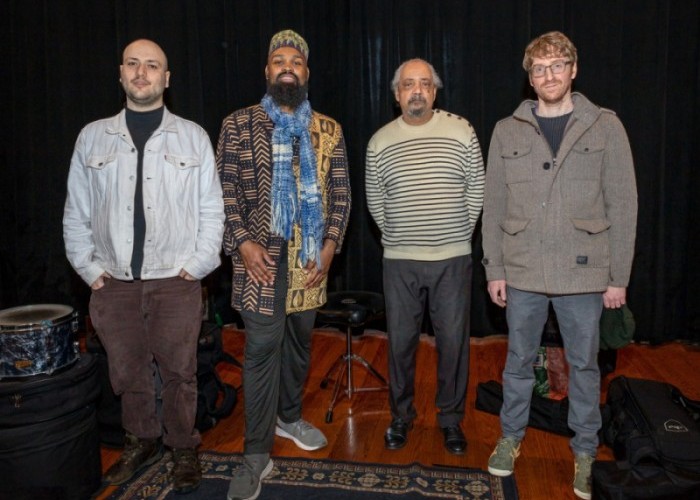Jan 13, 2026 2:09 PM
More Trump-Kennedy Center Cancellations
The fallout from the renaming of the John F. Kennedy Center for the Performing Arts to include President Donald…

Teiku plays to the spiritual side of Jewish ancestral songs with avant-jazz soundscapes.
(Photo: Jamie Feldman)577 Records has a knack for discovering exceptional emerging artists and bringing them to the forefront of jazz and improvisation. This year, the Brooklyn-based independent record label has released four debut albums that demonstrate the diverse range and fluidity of its roster. The London-based quartet Bag of Bones leans toward lyrical melodies and buoyant, accessible improvisation on No One Gets Saved (39:49 ★★★½), while Room 31’s Crazy Town (37:49 ★★★½) and saxophonist Ayumi Ishito’s The Roboquarians, Vol. 1 (54:29 ★★★½) are more influenced by the downtown New York scene. The fourth debut album, the self-titled Teiku (57:39 ★★★★), is more spiritual in nature, using the bandleaders’ Jewish ancestral songs as a foundation for its electronic avant-jazz soundscapes.
From the outset, Bag of Bones propels us forward with punchy piano and percussion on “Onwards And Upwards,” setting the stage for the uninhibited energy that permeates throughout. Tenor saxophonist Riley Stone-Lonergan dances between loose bebop melodies and high-energy bursts, while Oli Hayhurst’s understated bass provides a steady foundation. “Chinny Reckon” showcases the quartet’s ability to create controlled chaos, punctuated by Rick Simpson’s uplifting piano. “For T.C.” offers a dark interlude, with drummer Will Glaser’s atmospheric beats and the sinewy call-and-response between Stone-Lonergan and Simpson. There is a level of ease and mastery to the quartet’s improvisation that is rare to see in a first outing.
Room 31’s Crazy Town has a more solemn, atmospheric vibe. Released on 577’s Positive Elevation sub-label, this record is a vessel to showcase the label’s dedication to experimental electronic music and avant soul. Baritone saxophonist Greg Sinibaldi and drummer/bassist Marlon Patton channel the experience of relocating to New York City as artists into frenetic free improvisation, electronic soundscapes and psychedelic soul motifs. Patton’s jangly percussion and Sinibaldi’s measured melodic lines on the NuRAD evoke a journey through uncharted territories on “The Jackal.” The title track pulsates with kinetic energy and avant-rock aesthetics. As the drums gradually build into a driving beat, Sinibaldi imbues the track with an otherworldly texture. Patton’s unrelenting yet understated backbeat provides a foil to Sinibaldi’s bluesy lines on the NuRAD and blustery, angular melodies on the saxophone.
Saxophonist Ayumi Ishito’s The Roboquarians, Vol. 1, which features guitarist George Draguns and drummer Kevin Shea, is probably the most avant garde of these in that it really leans into dissonance and angularity. “Dusseldorf Sunrise” juxtaposes frenetic electronic textures with genre-shattering motifs to evoke the feeling of being dropped into the middle of a musical maelstrom. “Diamonds In Bb” takes a different approach, with Dragon’s slow, methodical acoustic melody floating atop Shea’s furious drums to create a mesmerizing contrast between the meditative and the chaotic. “Mia Slavenska” and “Vibrations For Erzulie” delve into the realms of fluidity and femininity, with Ishito’s saxophone taking center stage amid hypnotic percussion and bright, jangly guitar melodies. Throughout the album, the trio demonstrates tight cohesion and imaginative improvisation.
Co-led by pianist Josh Harlow and percussionist Jonathan Barahal Taylor, Teiku is a quintet that uses free-jazz to explore and connect with the bandleaders’ Jewish-Ukranian heritage. Their eponymous debut album breathes new life into traditional Passover melodies that have been passed down the generations through aural tradition. Recordings of Harlow’s and Taylor’s parents reciting their family Passover hymns are weaved throughout the album, grounding the music in a profound sense of history and lineage. The interplay between instruments is masterful, with the woodwinds, played by Jaribu Shahid, Peter Formanek and Rafael Leafar, providing a deep, earthy resonance on “Ki Leh Noeh” and “Psalm 136.” The album culminates with “Echad Mi Yodea,” an intimate exploration of spiritual and mental liberation, as gongs and singing bowls mingle with sparse woodwinds and archival vocals. Teiku is a testament to the power of music to transcend time and space, offering listeners a journey of introspection and spiritual connection. Together, these albums show the depth and breadth of experimental music today. DB
Ordering info: 577records.com

Belá Fleck during an interview with Fredrika Whitfield on CNN.
Jan 13, 2026 2:09 PM
The fallout from the renaming of the John F. Kennedy Center for the Performing Arts to include President Donald…

Peplowski first came to prominence in legacy swing bands, including the final iteration of the Benny Goodman Orchestra, before beginning a solo career in the late 1980s.
Feb 3, 2026 12:10 AM
Ken Peplowski, a clarinetist and tenor saxophonist who straddled the worlds of traditional and modern jazz, died Feb. 2…

The success of Oregon’s first album, 1971’s Music Of Another Present Era, allowed Towner to establish a solo career.
Jan 19, 2026 5:02 PM
Ralph Towner, a guitarist and composer who blended multiple genres, including jazz — and throughout them all remained…

Rico’s Anti-Microbial Instrument Swab
Jan 19, 2026 2:48 PM
With this year’s NAMM Show right around the corner, we can look forward to plenty of new and innovative instruments…

Richie Beirach was particularly renowned for his approach to chromatic harmony, which he used to improvise reharmonizations of originals and standards.
Jan 27, 2026 11:19 AM
Richie Beirach, a pianist and composer who channeled a knowledge of modern classical music into his jazz practice,…